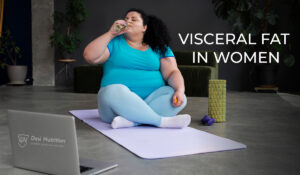Menstrual periods are natural and essential for a person’s life with a female reproductive system. It is a part of their life and this article will discuss how you can manage your periods, foods to eat during periods, and avoid while you are menstruating.
First of all, let’s see what is a menstrual period:

The key part of the menstrual cycle is called a menstrual period or simply a period that occurs every month. In this period the blood and tissue from the lining of the uterus leave the body through the vagina. It happens when the girl reaches the end of puberty usually at the age of 11-14 and continues till menopause, when your ovaries stop releasing eggs. The age of menopause is usually 45 to 55.
Menstrual cycle:
Menstrual cycles are 28 days but can be anywhere between 21-28 days varying from person to person. The menstrual cycle is divided into several phases:
Phase 1: the menstrual phase
The menstrual phase lasts for 1-5 days during which the thick lining of the uterus is shed in the form of blood. The bleeding lasts for 3 to 7 days. In this phase, you will experience some symptoms like abdominal cramps, bloating, mood swings, and fatigue.
Phase 2: Follicular phase
This phase starts on the first day of the period and lasts until ovulation. Your pituitary gland releases follicle-stimulating hormone (FSH) stimulating the ovaries to produce several follicles. These follicles contain eggs. The follicular phase initially overlaps the menstrual phase. After that, the lining of the uterus starts to thicken to prepare it for potential pregnancy.
Phase 3: Ovulation
On the 14th day, or say in the middle of the cycle, the luteinizing hormone causes one of the follicles to release an egg from the ovary. This is a process called ovulation. The egg that is released by the follicle travels to the fallopian tube towards the uterus. Pregnancy is more likely to occur in this period of time because this is the most fertile time of the cycle if the egg is fertilized by the sperm.
Phase 4: Luteal phase
This phase lasts from 15-28 days. After ovulation, the corpus luteum secretes progesterone which maintains the thickness of the uterus lining. The Corpus luteum is a structure formed after the transformation of the empty follicle. The thickened lining of the uterus supports the pregnancy.
If pregnancy occurs, the fertilized egg implants in the uterus lining and the body will start to produce pregnancy hormones.
If the pregnancy does not occur the corpus luteum will break down and progesterone levels will drop resulting in the shedding of the uterus lining and you will get your period. The menstrual cycle carries on like this every month.
Common symptoms of a period:

- When the uterus is shedding the lining, it is actually shedding the blood and the tissues. You will feel cramps, especially in the abdomen because of the contraction of the uterine muscles that help to shed the lining.
- Hormonal changes can lead your body to gain weight temporarily, usually because of water retention. Your body stores extra water that makes you feel bloated.
- A woman on a period would have gone through mood swings because of the hormonal changes in the body. This can lead you to get irritated or can lead to emotional sensibility.
- Hormonal changes can also lead breast tissues to swell and become tender.
How do you manage menstrual symptoms?

Keep yourself hydrated:
The first thing you need to focus on is to be hydrated. This can help you to prevent bloating. And when you drink lots of water throughout the day, you will feel full which prevents you from emotional eating or overeating.
A balanced diet:
A balanced diet will help to regulate your hormones in your period. Make sure you eat a clean and healthy diet during your periods. Your body craves high-sodium, carbs, and sugar but all of this food is going to make it hard for you to manage your periods. Keep yourself healthy by eating food that will support hormonal balance. We will discuss the foods to eat and avoid further in this article.
Heat therapy:
Cramps could be problematic in your periods. You should use heat therapy by applying a heating pad or hot water bottle could help in reducing abdominal cramps.
Pain relief:
If the cramps are bad, you might have to take some pain relief. Pain-relievers like ibuprofen can help alleviate the pain and cramps.
Exercise:
Regular exercise can also help to relieve pain and cramps. If you will keep your body active you can experience better periods without pain. And exercising also supports overall vagina health.
Relaxation techniques:
You can balance the hormones by practicing some relaxing techniques that will help you to manage your periods. These practices can also help you to manage stress which is good for your overall health. Indulge in activities like yoga, meditation, and deep breathing exercises which can help you alleviate mood swings.
Should you see a doctor?

There are some situations in which you should visit a doctor with respect to your menstrual cycle:
- If you are experiencing irregular periods, or changes in cycle length, frequency, or flow, you should consult a medical expert. These could be the underlying symptoms of some health issues like PCOS or some other issues related to your reproductive system.
- If you experience severe pain every month while you are menstruating, you might need medical assistance.
- Heavy flow in some women is common but if you have to change your sanitary pad or tampon every hour or so, then you should visit a healthcare expert.
- Absence of period is one major reason to visit a healthcare expert if you are not pregnant. Absence of periods demands a medical check-up.
Foods to eat in periods:

Eating a balanced diet can help you manage your periods effectively. You should focus on consuming healthy food that can provide you with sufficient nutrients to keep you healthy. Hormonal changes can lead to other issues like menstrual cramps, mood swings, bloating, body pain, or sometimes even fever. Healthy food intake can alleviate these symptoms.
Include these foods in your diet that can help to alleviate menstrual symptoms like:
Leafy green vegetables:
Leafy green vegetables contain high content of iron which can help to balance out the loss of iron during menstruation. Vegetables like spinach, kale, and Swiss chard are good sources of iron. Along with it leafy green vegetables also provide calcium and magnesium which can help to reduce menstrual cramps.
Fruits:
Consuming fruits during your periods can help you get essential vitamins and minerals. Fruits like bananas are a rich source of potassium that will help prevent bloating because of water retention. Water weight is the result of high sodium food intake. Potassium helps to balance out sodium.
Fruits like oranges and berries are a great source of vitamin C that helps to boost the immune system and reduce inflammation.
Whole grains:
Whole grains are a great source of fiber and complex carbohydrates. Fiber helps you feel full and avoid overeating cravings or emotional eating. Fiber also helps to regulate digestion while carbs help to maintain sustainable energy in the body. Consume whole grains like oats, brown rice, and quinoa in your period.
Nuts and seeds:
Nuts and seeds like almonds, walnuts, chia seeds, and flaxseeds are rich in omega-3 fatty acids. They also have anti-inflammatory properties that can help reduce the inflammation in your body. People on periods should consume nuts and seeds because they are also a good source of magnesium that will help to reduce cramps and improve your mood.
Lean protein:
Chicken, fish, tofu, and beans are good sources of lean protein. Protein helps to make you feel full; hence controlling your hunger and avoiding cravings.
Dark chocolate:
Dark collate is a good source of magnesium; hence reducing cramps and improving your mood. Choose dark chocolate with 70% cocoa. It contains antioxidants that can boost your mood by increasing serotonin levels.
Yogurt:
Yogurt is a rich source of calcium and probiotics. Consuming yogurt during your periods can promote healthy digestion and reduce bloating.
Herbal teas:
Try herbal teas like chamomile, ginger, and peppermint. Herbal teas are great alternatives to plain simple water and along with being a healthy option for your overall health, herbal teas also help to soothe out menstrual cramps and reduce bloating. Where ginger tea can help to reduce inflammation in the body, chamomile tea can help to make you feel relaxed and improve your sleep.
Foods to avoid during periods:

When on periods, make sure you are eating healthy. You need to eliminate foods that contain high salt, and sugar or use processed ingredients. Avoid foods like:
Avoid salty foods:
Foods like chips, canned soups, processed meats, and other processed foods lead to water retention and bloating. You need to avoid these foods during your periods.
Avoid sugary foods:
Avoid excess sugar because that can cause energy crashes which can lead to mood swings. Eliminate foods like sweets, candies, and sugary drinks including sodas.
Caffeinated drinks:
Drinks containing caffeine increase anxiety and irritability because of the hormonal imbalance. This can worsen your cramps and also lead to dehydration because of its diuretic effects.
Alcohol:
Drinking alcohol during your period could lead to bloating and dehydration. It can also increase the production of ghrelin, the hunger hormone leading to overeating.
Frequently Asked Questions
What are the best foods to eat in periods?
Ans. The best foods to consume during periods are lean protein like chicken, fish, and tofu; and whole grains, like oats, quinoa, and brown rice. You should consume green leafy vegetables like spinach, kale, and Swiss chard. Adding a variety of fruits to your diet can also help you to manage your periods.
What foods to avoid during periods?
Ans. A person should avoid consuming high-sodium foods like chips, processed foods, alcohol, sugary food, and drinks during their periods.
What fruits are best for periods?
Ans. Foods like berries, apples, papaya, and watermelon are some of the best fruits to consume during periods.



